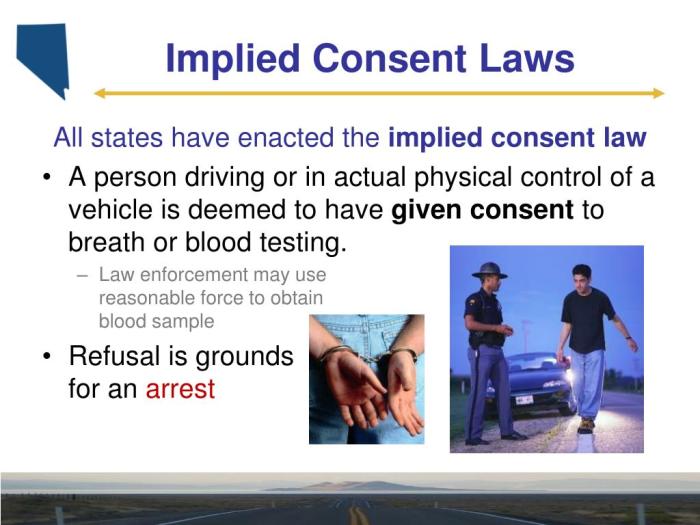La ley de consentimiento implícito indica que – Implied consent law, a fundamental legal concept, plays a pivotal role in defining the boundaries of consent in various contexts. This article delves into the intricacies of implied consent, exploring its definition, elements, limitations, legal consequences, and comparison with express consent.
Implied consent, unlike express consent, arises from the conduct or circumstances that reasonably indicate an individual’s willingness to engage in a particular action. Understanding the nuances of implied consent is crucial for individuals and professionals alike, as it impacts a wide range of legal scenarios, including medical procedures, business transactions, and personal relationships.
Definition and Scope of Implied Consent Law

Implied consent is a legal doctrine that presumes consent in situations where an individual’s conduct or actions indicate their willingness to participate in a particular activity or accept a specific condition.
Situations Where Implied Consent is Applicable
- Medical treatment in emergency situations
- Consensual sexual activity
- Use of personal information for research purposes
- Acceptance of terms and conditions when using online services
Elements of Implied Consent

Implied consent requires the following elements:
- Objective manifestation of consent:Conduct or actions that reasonably indicate the individual’s willingness to participate.
- Knowledge of the relevant facts:The individual must be aware of the nature and consequences of the activity.
- Capacity to consent:The individual must be mentally competent to make the decision.
The burden of proof for establishing implied consent lies with the party asserting it.
Factors Considered in Determining Implied Consent, La ley de consentimiento implícito indica que
- Prior conduct or experience
- Social customs and norms
- Verbal or nonverbal cues
- Surrounding circumstances
Limitations and Exceptions to Implied Consent

Implied consent is not applicable in all situations. Exceptions include:
- When the activity poses a significant risk of harm
- When the individual is under duress or coercion
- When the individual is incapable of consenting
Examples of Scenarios Where Exceptions to Implied Consent Apply
- Surgical procedures that require explicit informed consent
- Sexual activity with a minor
- Use of personal information for commercial purposes without explicit consent
Legal Consequences of Implied Consent: La Ley De Consentimiento Implícito Indica Que
The legal consequences of implied consent vary depending on the jurisdiction and the specific context. Potential consequences include:
- Liability for harm:If the activity results in harm, the party who implied consent may be held liable.
- Remedies:Individuals who believe their implied consent was violated may seek legal remedies such as injunctions or damages.
- Ethical implications:Implied consent raises ethical concerns, particularly in medical and research settings.
Comparison with Express Consent

Implied consent differs from express consent in the following ways:
- Form:Implied consent is inferred from conduct, while express consent is explicitly stated.
- Presumption:Implied consent presumes consent, while express consent requires clear and unambiguous affirmation.
- Revocation:Implied consent can be revoked by subsequent conduct, while express consent must be revoked explicitly.
Advantages and Disadvantages of Implied Consent
Advantages:
- Expedites decision-making in time-sensitive situations
- Avoids the need for explicit documentation
Disadvantages:
- Potential for misinterpretation or ambiguity
- May not fully protect individuals’ autonomy
FAQ Insights
What are the key elements of implied consent?
The essential elements of implied consent include: Conduct or circumstances that reasonably indicate consent, Absence of explicit refusal, and Capacity to provide consent.
When is implied consent not valid?
Implied consent is not valid in situations involving coercion, fraud, mistake, incapacity, or where specific laws require express consent.
What are the potential legal consequences of implied consent?
The legal consequences of implied consent vary depending on the jurisdiction and context, but may include liability for damages, criminal charges, or loss of legal rights.